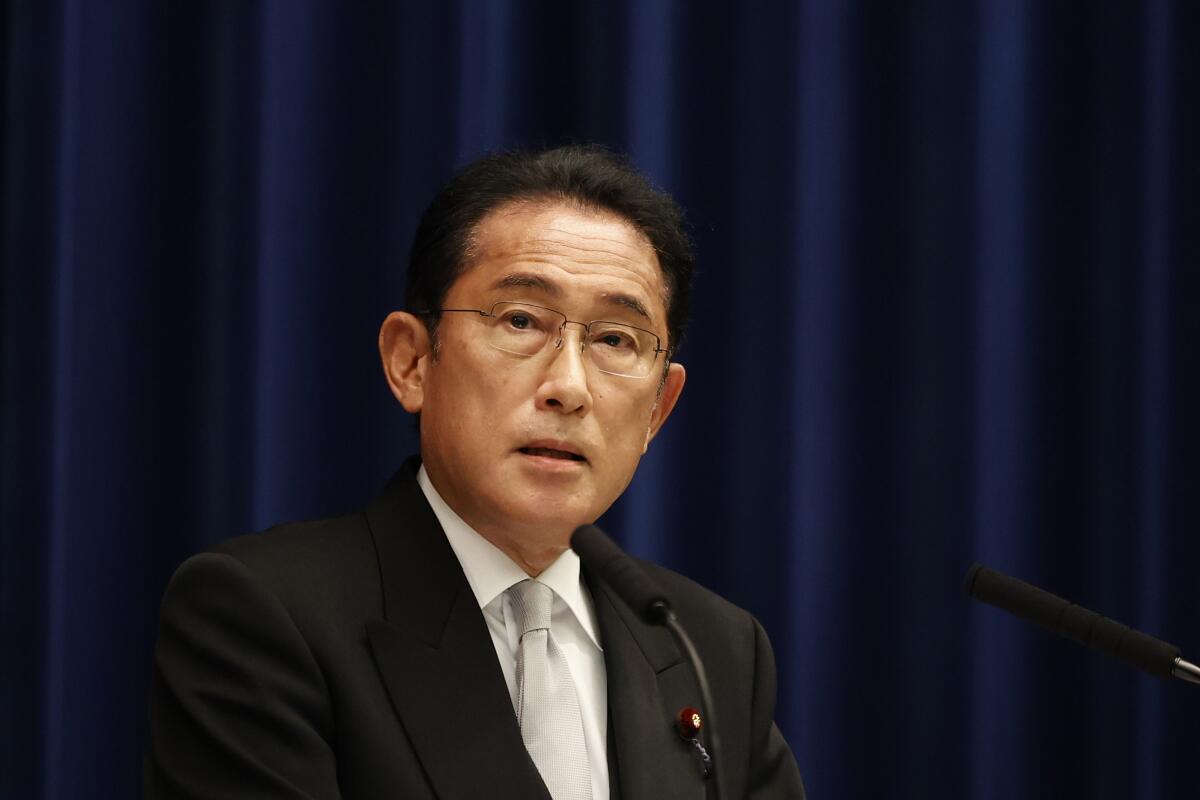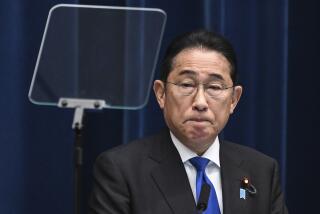Japan considering development of new nuclear reactors

- Share via
TOKYO — Japanese Prime Minister Fumio Kishida on Wednesday instructed his government to consider developing safer, smaller nuclear reactors, signaling a renewed emphasis on nuclear energy years after many of the country’s plants were shut down.
Kishida made the comment at a “green transformation” conference on bolstering the country’s efforts to curb emissions of greenhouse gases. Japan has pledged to reach carbon neutrality by 2050.
Anti-nuclear sentiment and safety concerns rose sharply in Japan after the 2011 Fukushima nuclear plant disaster, but the government has been pushing for a return to nuclear energy amid worries of power shortages following Russia’s invasion of Ukraine and a global push to reduce greenhouse gases.
The government, however, previously insisted it was not considering building new plants or replacing aged reactors, apparently to avoid stoking criticism from a wary public. Kishida’s comment on Wednesday represents a sharp change from that stance.
He said the panel presented proposals for the development and construction of “new innovative reactors designed with new safety mechanisms.” He called on the government to speed up its examination of “every possible measure” and reach a decision by the end of the year.
“In order to overcome our imminent crisis of a power supply crunch, we must take our utmost steps to mobilize all possible policies in the coming years and prepare for any emergency,” Kishida said.
“It is extremely important to secure all options to redesign a stable energy supply for our country,” Economy and Industry Minister Yasutoshi Nishimura told reporters. “From that perspective, we will also consider all options regarding nuclear power.”
Most of Japan’s nuclear power plants were taken offline following the Fukushima accident for safety checks under tightened standards.
A magnitude 9.0 earthquake and tsunami destroyed key cooling functions at the Fukushima Daiichi nuclear plant in March 2011, causing three reactors to melt and contaminating the region with massive radiation that still keeps some areas uninhabitable.
Japanese utilities have since set more than 20 reactors for decommissioning, largely because of the high cost of safety measures. Of the 33 workable reactors, 25 have been screened for safety checks by the Nuclear Safety Authority. Seventeen have been approved so far, but only 10 have restarted after gaining consent from local communities, including three currently off line for regular safety inspections.
The government has already announced plans to speed up restarts and have up to nine reactors restarted by winter to cope with the energy crunch. It aims to restart seven other reactors after next summer and to further prolong the operational life of aging reactors to beyond 60 years from the initial 40 years.
Some energy experts say so-called next-generation reactors, such as small modular reactors, could be costly and add a financial burden to plant operators.
Toyoshi Fuketa, commissioner of Japan’s nuclear watchdog, the Nuclear Safety Authority, told reporters on Wednesday that his agency’s safety standards are not affected by the government’s nuclear energy policy. Japan does not yet have safety standards for next-generation reactors and it would take more than a year to set such guidelines, while the safety of aging reactors needs to be carefully examined individually, he said.
Critics say the true cost of nuclear energy would be much higher if the expense of radioactive waste management and final storage facilities are included, and that there are long-term environmental hazards of another Fukushima-like accident. They also say Russia’s attacks on a nuclear plant in Ukraine show they are a potential security risk and need to be better protected.
Tokyo Electric Power Company Holdings, the operator of the Fukushima Daiichi plant, has come under fire over lax safeguards at another plant, Kashiwazaki-Kariwa, where it is seeking to restart two reactors. The reactors are among the seven that the government wants to quickly restart.
More to Read
Sign up for Essential California
The most important California stories and recommendations in your inbox every morning.
You may occasionally receive promotional content from the Los Angeles Times.










